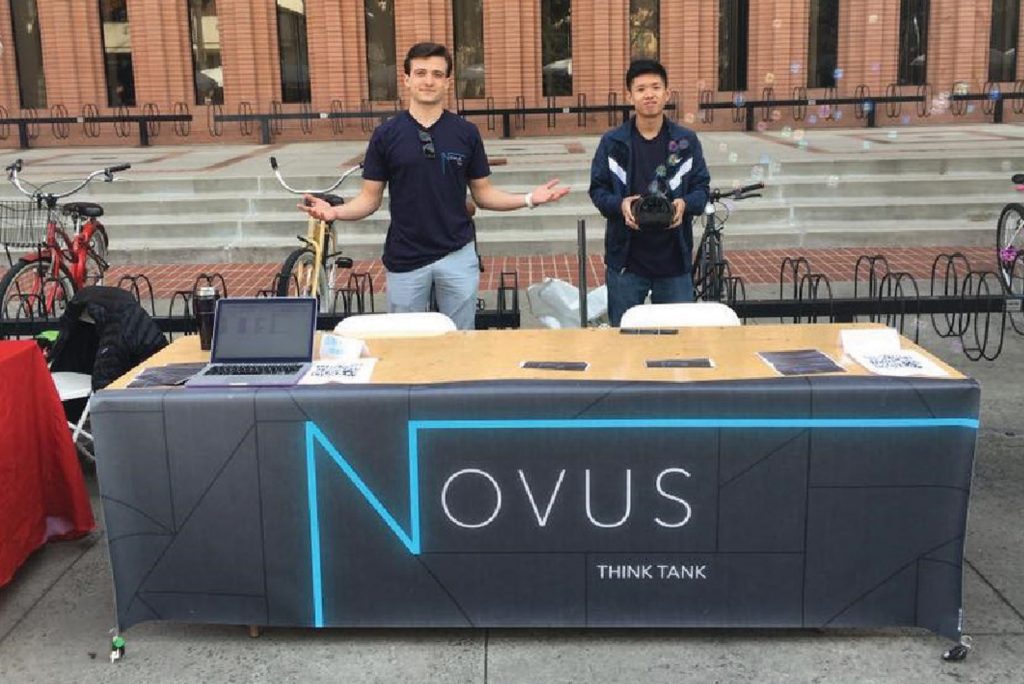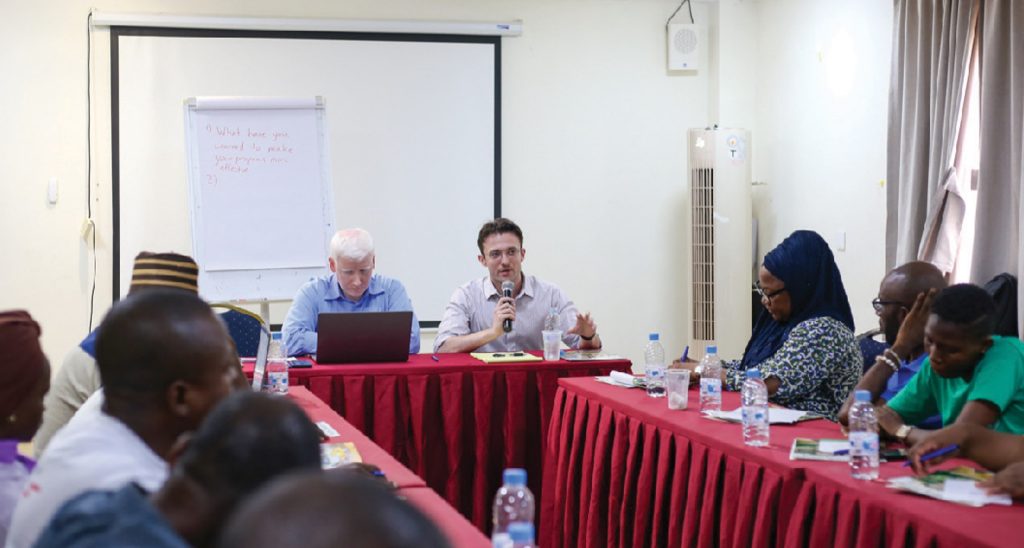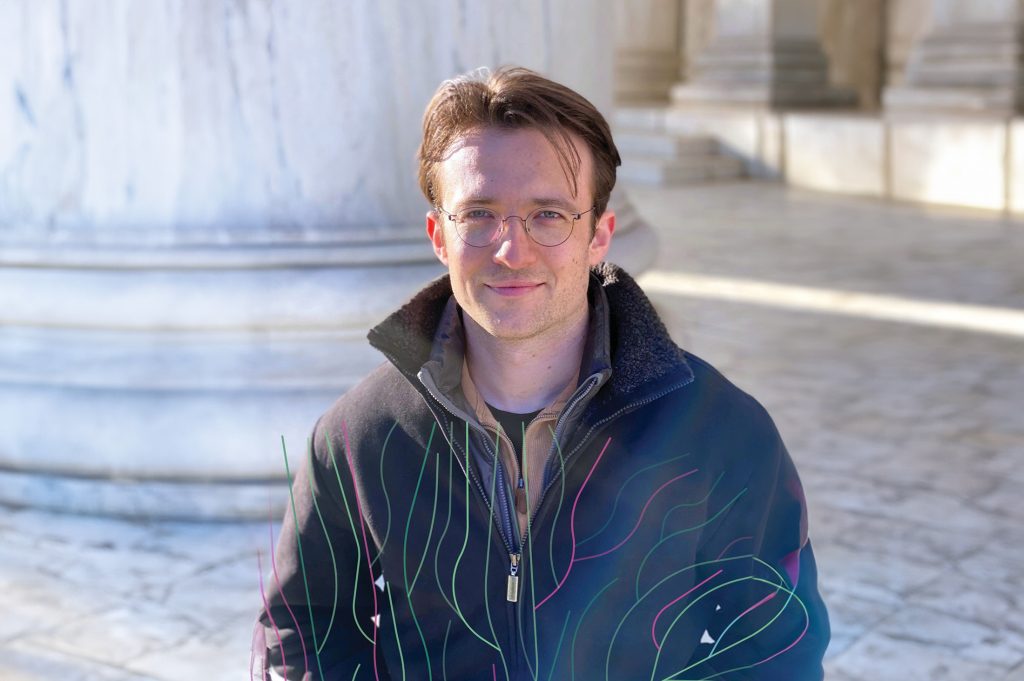A resolute advocate for democracy, Max Henning, ’11, is dedicated to harnessing the power of neuroscience and social and behavioral sciences for social good.
What fuels his passion? A profound desire to explore how the biological roots
of emotion can profoundly influence—and potentially unlock solutions to—some of today’s most persistent global challenges.
MINDFUL ORIGINS
Henning’s initial interest in behavioral and neuroscience originated in a place you might not expect: on the athletic field, as a high school soccer player at the top of his game.
As an athlete, Henning gained an early awareness of the importance of mindset and work ethic—driven home by CA’s Coach Eric Moore, with whom he worked closely in training. “The weight room became a
second home to me—I experienced firsthand how performance-mindset practices and work ethic, in a supportive environment, translated into tangible improvements on and off the field.”
While at CA, Henning grappled with issues common among high schoolers— struggles with bullying, difficulty with social belonging, and depression. His father, a practicing Buddhist, proposed a unique solution: a week-long silent meditation retreat. The experience was a game-changer for Henning.
“Spending a week in silence changes your brain. It’s not like you necessarily get big insights, but your mind gradually calms. Your patterns of perception and thinking change; you start noticing different things. Rumination dissipates; colors become brighter.
“I became fascinated with how the brain works because it can construct these wildly different realities depending on your state and what is going on in your life.”
After a career-ending injury, Henning found himself with the opportunity to build a new identity outside soccer. Spurred by his emergent interest in the brain, he threw himself into scientific coursework as an undergraduate at the University of Southern California, landing a research assistantship with Dr. Antonio Damasio, the director of USC’s prestigious Brain and Creativity Institute and an internationally renowned scientist and professor of neuroscience, psychology, philosophy, and neurology.
SYNTHESIZING CHANGE
For five years, Henning worked alongside Dr. Damasio, investigating how the human brain processes feelings. Their research explored the biological underpinnings
of positive and negative feeling—the molecular systems that drive them and their evolution over time—to develop Damasio’s theory of feeling and consciousness, which fundamentally challenges traditional views of human behavior and the role of emotion in rational thinking. (His contributions were later featured in Damasio’s book, The Strange Order of Things: Life, Feeling, and the Making of Cultures.)
Henning explains: “Historically, scientific thought has developed from this idea
that truth is based on reason, on what we perceive, prove, and agree on about the outside world. The interior world of feeling has been relegated to the domain of religion, arts, or other non-scientific pursuits.
“But modern neuroimaging has discerned objective features in the brain that accompany different feelings. So, feeling now can be understood objectively and scientifically, in biological terms, really for the first time in human history. And now we know that the brain and body is an interconnected system. You actually can’t separate feeling and emotion from rational thought in the way we’ve been taught; they are inextricably linked. You can’t make good rational decisions without feeling.”
This is a profound discovery that Henning believes has potentially far-reaching implications for society.
“It suggests that feelings and emotions are not subjective or arbitrary. Far from it, they are the manifestations of concrete biological processes. They signal important truths about what humans need to survive and thrive.”
THEORETICAL IMPACT
In his junior year, eager to apply these insights, Henning founded Novus Think Tank. The collaborative student organization aimed to empower socially minded students to move the needle on systemic issues.
“Novus was built on the idea that we could enable novel solutions to difficult problems if, rather than tamping them down, we validated and supported young people’s intrinsic and emotional motivations to build a better future.”
Soon, Novus had attracted a group of like-minded students who met weekly to
consider how to effect lasting positive change on causes that were personally meaningful. Since its founding, Novus members have effectively tackled various issues, from political depolarization to violence reduction to destigmatizing mental health and beyond.

AFFECTIVE POLITICS
While Novus underscored the positive potential of a feeling-forward framework, the simultaneously unfolding 2016 presidential election offered a sobering contrast. It would prove to be a watershed moment for Henning.
“The toxicity showing up in politics used feeling and emotion in a way that I recognized. It tapped into fear and anger. These emotions change the body at a biological level, which, in turn, shapes the way that people think. It shifts their behavior in fundamental and powerful ways.” For Henning, the emotional authoritarian rhetoric was made more concerning by the orchestrated response—grounded in data and appeals to reason—from movements seeking to depolarize the political climate and maintain democracy.
“I realized that those on one side of this flashpoint effectively leveraged feeling; the other did not. I saw clearly that if pro-cooperation, pro-democratic
movements didn’t tap into felt motives for agency, purpose, and belonging—through togetherness, interdependence, and care, instead of fear and anger—we would be unable to counter this alarming slide into authoritarianism.”
With politics and social advocacy outside the scope of the BCI, Henning made a change. In 2021, he moved to Washington, D.C., embarking on a master’s program at Georgetown University.
Now in the final year of his program, Henning is a research fellow at Georgetown’s Center for Democracy and Civil Society and a Social and Behavioral Science Technical Specialist with Democracy International,
an NGO that supports democratic systems and practices abroad. In both roles, he’s at the cutting edge of integrating the science of emotion and feeling into the realm of democracy and governance.
Henning’s work is not confined to the theoretical; it’s practical and impactful. He designs and implements innovative research and on-the-ground programming that considers emotional, cognitive, and social factors to nurture pro-democratic behaviors that can drive meaningful social change.
Henning’s work is not confined to the theoretical; it’s practical and impactful. He designs and implements innovative research and on-the-ground programming that considers emotional, cognitive, and social factors to nurture pro-democratic behaviors that can drive meaningful social change.
What does that look like? A recent project has taken him to Ghana, where he sought to understand public officials’ values and moral beliefs to appeal more effectively to them to increase accountability to citizens. In Kosovo, he has worked with municipal officials on applying behavioral science to strengthen programs aiming to foster increased civic engagement.

FUTURE FRONTIER
While his work with Democracy International primarily centers on global efforts, he is exploring how his research might spark domestic change and address the fragmented social fabric within American communities.
“In the US, we face a distinct challenge: the government feels remote from many people’s daily lives. The question becomes: How do we reinvigorate community engagement?
How do we restore a sense of belonging and agency in individuals?”
For Henning, the solution is clear: pivot our strategies and institutions to integrate emerging research on feeling and its impact on human behavior.
It’s an ambitious endeavor, but Henning believes that it is vital to try.
“We can’t expect success in areas like climate action, democratic renewal, or human rights until we align these efforts with a deeper understanding of how humans actually work. So far, our attempts to foster positive change haven’t fully considered the real drivers of human actions. We’ve been tackling these issues with the wrong tools.
“We now have access to whole new data sets that offer deeper insights into human experience and action,” Henning explains. “For perhaps the first time, we have the information and tools to mobilize cooperative behavior and effectively reshape some of our social systems to meet these formidable challenges. These possibilities—they give me real hope for what we can achieve in the future.”

